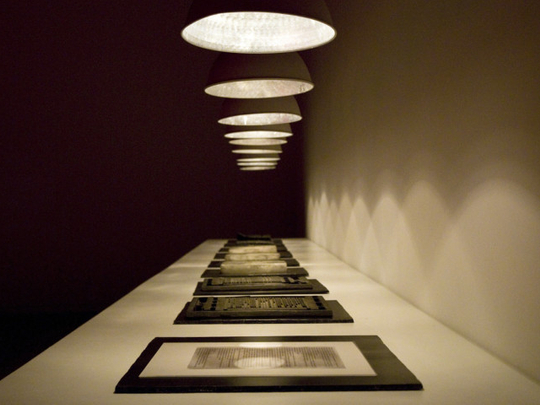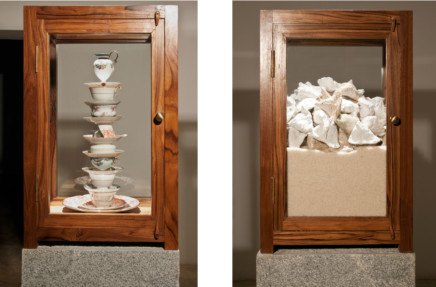
1x1 Gallery, one of the oldest art galleries in Dubai has now moved to a larger location in Alserkal Avenue, Al Quoz. The gallery, founded in 1996 by Malini Gulrajani, specialises in showcasing modern and contemporary Indian art.
The gallery’s new, nearly 700-square metre warehouse has two large exhibition spaces — a private viewing room where collectors and art lovers can view the gallery’s collection of Indian art, and Editions 1x1, a store featuring an eclectic selection of art books and limited edition works of art, design and craft.
I Know Nothing of the End by Sudarshan Shetty; hand-carved teak wood
“As an important platform for both established and emerging artists, 1x1 supports its programme through structured collaborations with local and international galleries, art fairs and museums as well as with independent curators and art organisations. Publications are an integral part of our programme, which is aimed at documenting our exhibitions and promoting partnerships with art writers and cultural activators.
“In recent years we have actively included Emirati and Middle East-based artists in our exhibition schedule, thus embracing an idea of collaborative projects and initiatives with a predominantly cultural orientation. Having a larger space gives us the opportunity to enhance our programme by hosting film screenings, workshops, artist talks and other cultural activities,” Gulrajani says.
The gallery’s inaugural show at the new space is a group exhibition of works by leading Indian artists Anju Dodiya, Bharti Kher, Chittrovanu Mazumdar, Hema Upadhyay, Mithu Sen, Nasreen Mohamedi, Sudarshan Shetty and Zarina Hashmi. The artworks range from paintings and collages to sculptures and large installations, illustrating the richness, diversity, depth and vitality of contemporary Indian art. Although the works engage with local themes, traditions and crafts, they address universal issues such as gender inequality, identity, migration and the human condition.
Bharti Kher’s installation “The Mistress and Master of Grand Ceremonies” is a humorous take on the way “boy” meets “girl” for an arranged marriage in India. The work comprises two large glass cabinets placed on solid granite blocks. A bone chine tea set precariously stacked in one cabinet, and shiny white ceramic “samosas” and rice grains in the other allude to the awkwardness of the whole situation where the “girl” must serve tea and snacks to the prospective groom and his family, with all eyes focused on her.
Also included in the show is one of Kher’s well-known “bindi” works, created from multi-coloured “bindis” stuck on wooden board.
Sudarshan Shetty has transformed everyday objects into profound works of art. What seems like a carpet with realistic looking folds is actually a piece of carved teak wood, sourced from old, demolished houses in Mumbai. The work evokes the subjectivity of memories and questions ideas of real and fake, old and new, function and meaning, everyday object and art.
In another work, a cracked traditional ceramic pickle jar, repaired with brass and wood, sits on a wooden shelf as a reminder of the impossibility of reclaiming or restoring a fragmented past.
Shetty’s most eye-catching work is a huge, intricately hand carved teak wood cage titled “I Know Nothing of the End”. The piece, which is inspired by the design of a window of the Sidi Saiyyed mosque in Ahmedabad, Gujarat, represents both the human body and the psychology of the presented self. The carved body alludes to the distortion caused by the five senses on our perception of self and the consequent internal struggle that we deal with every day. A sword oscillating inside represents the barriers in our passage to the other side, and the phrase “where will you go” placed above a single set of stairs serving both as entrance and exit, asks existential questions that have no answer.
Hema Upadhyay has used aluminium sheets, tarpaulin, scrap metal, plastic sheets and other found materials to recreate an aerial view of a slum in an installation titled “Modernization”.
Spread on the floor, the work conveys a sense of overcrowding, impermanence and deprivation, but also of close relationships between the people. Although this work is inspired by the slums of Mumbai, it comments on the global impact of urbanisation on human relationships and the environment.
Mithu Sen’s installation “Once Upon a Sari” features old, found saris and artificial plaits braided together. The work tells stories of loss, displacement, migration, memories, identity and cultural heritage in the collective voice of the unknown women who once owned and wore these traditional Indian garments and hair adornments. The show also includes a series of playful mixed media drawings by the artist, titled “I Would Still Commit the Original Sin”.
Chittrovanu Mazumdar’s installation is a luminous arrangement of light bulbs controlled by a dimmer. “This burgeoning honeycomb pregnant with light waiting to deliver grace is about the birth of light. It splits itself to become many from one part and its light emanates a promise of truth, of sight and of a secret unrevealed,” the artist says.
In stark contrast, Zarina Hashmi’s sculpture “Frozen Light”, featuring 101 light bulbs carved out of marble, contains the idea of light but does not release any warmth or light. In a series of minimalist collages, the artist has used gold dust and gold leaf on handmade paper stained with Sumi ink to represent the idea of divine light and the eternal search for spiritual enlightenment.
Anju Dodiya’s poetic, mystical acrylic on fabric paintings titled “Listener” speak about the need for human beings to connect with their surroundings, to listen to what nature is telling us and to be aware of the long term impact of our actions.
Nasreen Mohamedi’s untitled ink and pencil drawings on paper showcase the unique and subtle vocabulary of one of the most important modern artists from India, who has been recognised internationally in the last decade.
Jyoti Kalsi is an arts-enthusiast based in Dubai.
The group show will run at 1x1 gallery, Alserkal Avenue, until January 4, 2016.












